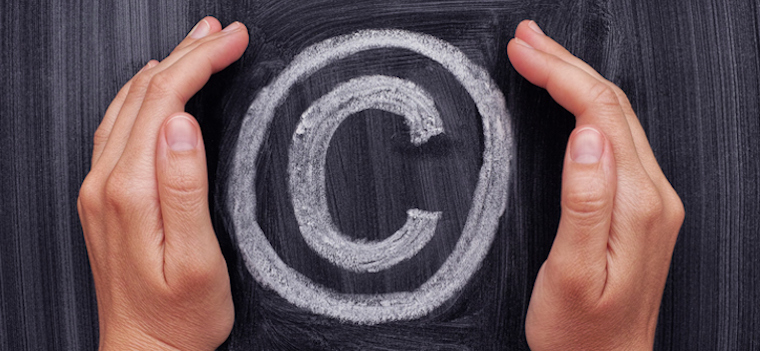If you add images to a tweet, post, update, etc., there’s a better chance the post will have the response you desire, compared to posts that have no image.
150% | Twitter | Percentage increase in retweets if an image is included
230% | Facebook | Percentage increase in post engagement if an image is included
323% | Use of product directions | Percentage increase in correctly followed directions if illustrations are included.
Illustrations and photography add power and understanding to your social media activity. But no matter how much you want to add a photo to that post, you can’t just google up an illustration and add it to a blog post or tweet. In the U.S. and most countries, the creator of an image is automatically granted the copyright to an image they create. While you may see the copyright symbol that looks like this, ©, next to the image, the symbol is not necessary. It’s merely a reminder that you don’t own the photograph.
An image copyright means no one else can use that image without the creator or copyright owner giving them permission to do so. In the United States, section 106 of the Copyright Law clearly states that no one else can reproduce the work, prepare derivative works based upon the copyrighted work, distribute the work, or display the work.
While there are a few exceptions to copyright laws, the best answer to the question,
“Can you post a copyrighted photo on social media?” is “No.”
If you retweet a copyrighted photo on Twitter, are you likely to get a “DMCA Notice of Alleged Infringement” requiring you to remove the image you’ve posted to Facebook or Twitter? (Probably not, but we’re not lawyers and if that’s what you need, maybe try Legal Zoom.) According to the Electronic Frontier Foundation’s Legal Guide for Bloggers, “a thumbnail (reduced-size) image, or a portion of a larger image is more likely to be fair use than taking an entire full-size image.” And in most cases, a link to another site on social media or a blog will automatically include an image from the linked-to site. If the copyright holder has a problem with such usage, they will take it up with the social media company, not you.
Rather than get into trouble, at SmallBusiness.com we pay a license fee for stock photography. Or we seek sources of art that are not copyrighted. Or we take the photos ourselves.
Related: The SmallBusiness.com Guide to Creative Commons
Links to copyright policies of the most used social media platforms
Social media platforms have taken steps to protect both themselves and their users in regards to image copyrights. Each social media network you use has its own rules regarding image copyrights. Before using an image on these platforms, or picking up an image from them, be sure to read through their specific policy. Here are links to copyright policies for most popular social media networks/
Provides information about copyrights, including how you can protect your own copyrighted works and avoid infringing the copyrights of other people when posting to Facebook, as well as how Facebook addresses reports of copyright infringement.
If you are unsure whether you hold rights to a particular work, please consult an attorney or another advisor as Twitter cannot provide legal advice. Tip: In general, the photographer and NOT the subject of a photograph is the actual rights holder of the resulting photograph.
If you believe someone is using your copyrighted work without your permission, you may wish to fill out this form. You can also mail our designated agent. Please be sure to include a complete copyright claim in your report. Keep in mind that you don’t need an Instagram account to submit a report.
Pursuant to the Digital Millennium Copyright Act (17 U.S.C. § 512), LinkedIn has implemented procedures for receiving written notification of claimed infringements. LinkedIn has also designated an agent to receive notices of claimed copyright infringement.
Pinterest respects the intellectual property rights of others and we expect people on Pinterest to do the same. It’s our policy—in appropriate circumstances and at our discretion—to disable or terminate the accounts of people who repeatedly infringe or are repeatedly charged with infringing copyrights or other intellectual property rights.
“Find out how to manage your rights on YouTube and learn more about respecting the rights of others.”
Supplementary Copyright Registration
On July 17, 2017, the U.S. Copyright Office (a part of the Library of Congress) implemented an online application requirement for supplementary registration. This adds more protection to copyright holders by allowing them the ability to update or clarify copyright information related to a specific creative work. The supplementary registration application may be accessed through the office’s online registration system.
Links to additional resources and information regarding copyright
Copyright.gov | Frequently asked questions about copyright
The U.S. Copyright Office is responsible for administering a complex and dynamic set of laws, which include registration, the recordation of title and licenses, a number of statutory licensing provisions, and other aspects of the 1976 Copyright Act and the 1998 Digital Millennium Copyright Act.
Electronic Frontier Foundation |Legal Guide for Bloggers
The Bloggers Guide to Intellectual Property is a list of frequently asked questions regarding issues that arise when you publish material created by others on your blog.
Berkman Klein Center | Lumen
Lumen is an independent 3rd party research project studying cease and desist letters concerning online content. Its goals are to educate the public, to facilitate research about the different kinds of complaints and requests for removal–both legitimate and questionable–that are being sent to internet publishers and service providers, and to provide as much transparency as possible about the “ecology” of such notices, in terms of who is sending them and why, and to what effect.

